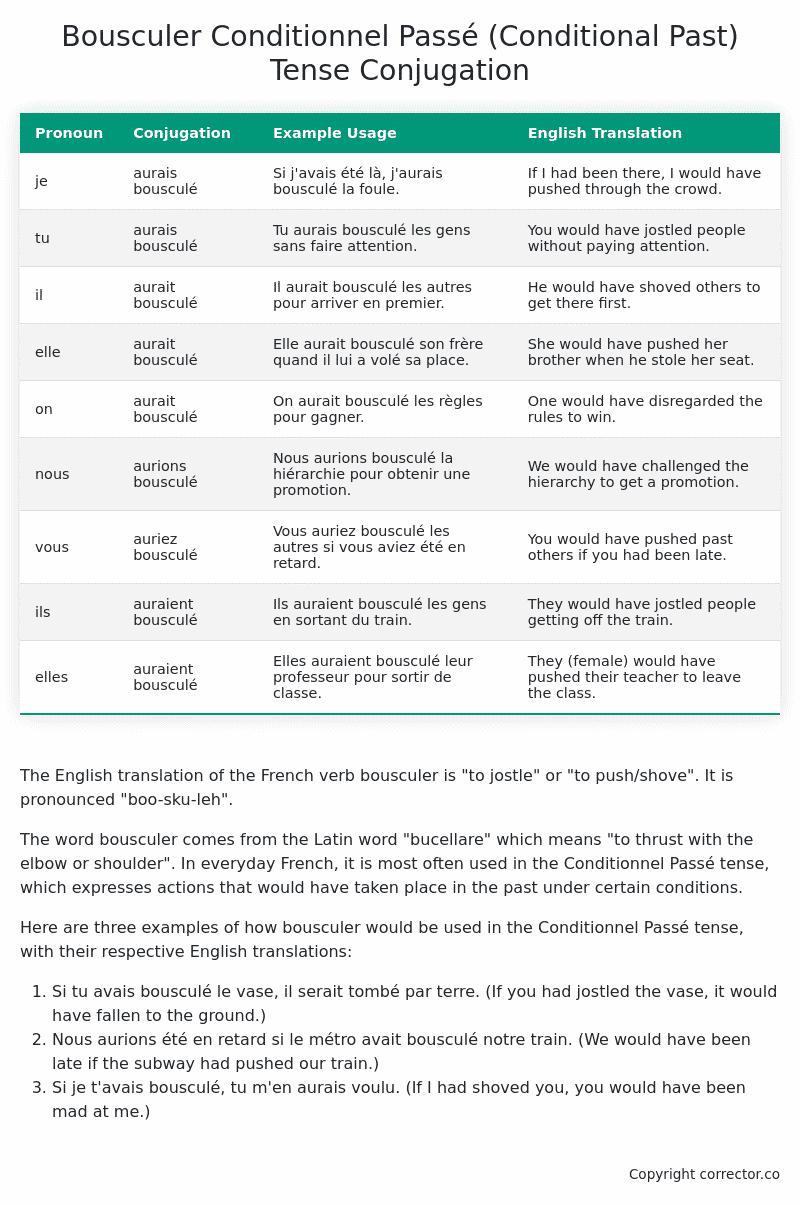Conditionnel Passé (Conditional Past) Tense Conjugation of the French Verb bousculer
Introduction to the verb bousculer
The English translation of the French verb bousculer is “to jostle” or “to push/shove”. It is pronounced “boo-sku-leh”.
The word bousculer comes from the Latin word “bucellare” which means “to thrust with the elbow or shoulder”. In everyday French, it is most often used in the Conditionnel Passé tense, which expresses actions that would have taken place in the past under certain conditions.
Here are three examples of how bousculer would be used in the Conditionnel Passé tense, with their respective English translations:
- Si tu avais bousculé le vase, il serait tombé par terre. (If you had jostled the vase, it would have fallen to the ground.)
- Nous aurions été en retard si le métro avait bousculé notre train. (We would have been late if the subway had pushed our train.)
- Si je t’avais bousculé, tu m’en aurais voulu. (If I had shoved you, you would have been mad at me.)
Table of the Conditionnel Passé (Conditional Past) Tense Conjugation of bousculer
| Pronoun | Conjugation | Example Usage | English Translation |
|---|---|---|---|
| je | aurais bousculé | Si j’avais été là, j’aurais bousculé la foule. | If I had been there, I would have pushed through the crowd. |
| tu | aurais bousculé | Tu aurais bousculé les gens sans faire attention. | You would have jostled people without paying attention. |
| il | aurait bousculé | Il aurait bousculé les autres pour arriver en premier. | He would have shoved others to get there first. |
| elle | aurait bousculé | Elle aurait bousculé son frère quand il lui a volé sa place. | She would have pushed her brother when he stole her seat. |
| on | aurait bousculé | On aurait bousculé les règles pour gagner. | One would have disregarded the rules to win. |
| nous | aurions bousculé | Nous aurions bousculé la hiérarchie pour obtenir une promotion. | We would have challenged the hierarchy to get a promotion. |
| vous | auriez bousculé | Vous auriez bousculé les autres si vous aviez été en retard. | You would have pushed past others if you had been late. |
| ils | auraient bousculé | Ils auraient bousculé les gens en sortant du train. | They would have jostled people getting off the train. |
| elles | auraient bousculé | Elles auraient bousculé leur professeur pour sortir de classe. | They (female) would have pushed their teacher to leave the class. |
Other Conjugations for Bousculer.
Le Present (Present Tense) Conjugation of the French Verb bousculer
Imparfait (Imperfect) Tense Conjugation of the French Verb bousculer
Passé Simple (Simple Past) Tense Conjugation of the French Verb bousculer
Passé Composé (Present Perfect) Tense Conjugation of the French Verb bousculer
Futur Simple (Simple Future) Tense Conjugation of the French Verb bousculer
Futur Proche (Near Future) Tense Conjugation of the French Verb bousculer
Plus-que-parfait (Pluperfect) Tense Conjugation of the French Verb bousculer
Passé Antérieur (Past Anterior) Tense Conjugation of the French Verb bousculer
Futur Antérieur (Future Anterior) Tense Conjugation of the French Verb bousculer
Subjonctif Présent (Subjunctive Present) Tense Conjugation of the French Verb bousculer
Subjonctif Passé (Subjunctive Past) Tense Conjugation of the French Verb bousculer
Subjonctif Imparfait (Subjunctive Imperfect) Tense Conjugation of the French Verb bousculer
Subjonctif Plus-que-parfait (Subjunctive Pluperfect) Tense Conjugation of the French Verb bousculer
Conditionnel Présent (Conditional Present) Tense Conjugation of the French Verb bousculer
Conditionnel Passé (Conditional Past) Tense Conjugation of the French Verb bousculer (this article)
L’impératif Présent (Imperative Present) Tense Conjugation of the French Verb bousculer
L’infinitif Présent (Infinitive Present) Tense Conjugation of the French Verb bousculer
Struggling with French verbs or the language in general? Why not use our free French Grammar Checker – no registration required!
Get a FREE Download Study Sheet of this Conjugation 🔥
Simply right click the image below, click “save image” and get your free reference for the bousculer Conditionnel Passé tense conjugation!

Bousculer – About the French Conditionnel Passé (Conditional Past) Tense
Formation
Common Everyday Usage Patterns
Expressing Unreal Past Scenarios
Polite Requests or Suggestions
Expressing Doubt or Uncertainty
Interactions with Other Tenses
Conditional Present
Indicative Past Tenses
Conditional Future
Summary
Want More?
I hope you enjoyed this article on the verb bousculer. Still in a learning mood? Check out another TOTALLY random French verb conjugation!


